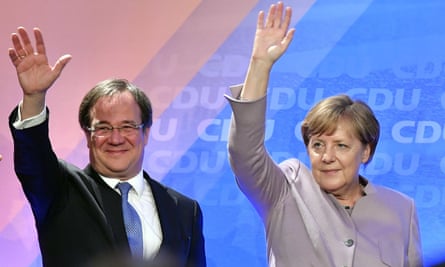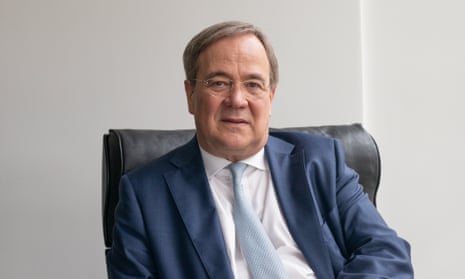Over her 16 years as German chancellor, Angela Merkel has gained a reputation as the world’s go-to consensus-builder, a relentless forger of compromises between political opponents. The man most likely to step into her shoes this September presents himself as someone with the ambition to outdo her.
Armin Laschet, the leader of the Christian Democratic Union (CDU) and conservative candidate for the top job at federal elections on 26 September, says he is a passionate European, a committed transatlanticist and a reliable ally of Israel.
But in a wide-ranging interview with the Guardian, the 60-year-old liberal conservative stressed that his chancellorship would seek to broaden the church, urging Europe to re-enter a dialogue with Vladimir Putin, warning against breaking off trade talks with China, calling for more diplomacy in the EU’s dealings with Hungary and Poland, and advising against escalating tensions with the UK.
“Even in the coldest of cold wars there was always economic exchange and a dialogue between civil societies,” Laschet said. “That has to be our principle – all while urging a respect for human rights.”
The cheerful Rhinelander, currently the state premier of North-Rhine Westphalia, has already proved his staying power in the race to become the CDU’s lead candidate, beating off challenges from the conservative hardliner Friedrich Merz and the Bavarian state premier, Markus Söder.
Polls show the CDU extending its dominance into the post-Merkel era, leading the second-placed Greens by about 10 points, with no clear majority likely for any coalition in which the CDU does not hold the senior role.
If he emerges triumphant in September, Laschet has promised a “decade of modernisation” for Germany. In his conversation with the Guardian, he cited reformist predecessors such as Konrad Adenauer, Willy Brandt, Helmut Kohl and Gerhard Schröder, though not Merkel.
“What is now due is a technological and procedural modernisation. It was already due before the pandemic, but the pandemic made us experience it even stronger,” Laschet said.
Anger at a vaccination programme seen to be slowed by cumbersome bureaucracy and an education system that struggled to switch to remote teaching led to the CDU’s approval ratings taking a nosedive at the start of the year.
“Too many decisions aren’t taken fast enough. The digitalisation of the administrative apparatus is not working adequately enough. All these processes have got too sedate, and lacking in the dynamism required to shape the transformation of an industrial society.”
But in most areas, Laschet suggested, the course has already been set, and unlike Brandt, Kohl or Schröder his mission would be one less of persuasion than implementation. The Franco-German treaty of Aachen, signed in his home town in 2019, provided plenty of “yet unused potential” for military cooperation and joint economic projects on artificial intelligence research and battery cell production, he said.
With the EU’s pandemic recovery plan, sufficient steps had already been taken to stabilise the single market, he said. “For the very first time, we are taking out joint debt, which goes against Germany’s basic philosophy. This was a big step for Germany, but one which was necessary for our cohesiveness.”
The €750bn recovery fund is due to last until 2026, thus covering Laschet’s potential first term in office. He concurred with his party’s stance that debt-sharing would remain a one-off. “It’s not a permanent carte blanche for the EU to make joint debts in the future.”
On measures to tackle the climate crisis, too, Laschet’s promise to voters is that the key decisions have already been taken, and their implementation will come as neither a threat to German industry nor to the personal inconvenience its citizens.

Laschet entered the European parliament in 1999, shortly before Vladimir Putin was first elected Russian president, and some former colleagues say his perspective on geopolitical relations is still powered by the optimism of that era. In the two decades since, relations between Russia and Europe have deteriorated dramatically, in spite of Merkel’s attempt to sustain a dialogue with the Kremlin.
“Diplomacy needs as many words as it can find,” Laschet said, insisting that Franco-German efforts to keep a line open with Putin had stopped the conflict in eastern Ukraine from escalating.
“But we have stopped negotiating. We are only now starting to realise that Europe is no longer in a dialogue with Putin. The American president has started the dialogue, because the European Council cannot agree on whether to talk to Putin. Such a situation weakens Europe.”
On Nord Stream 2, the gas pipeline connecting Vyborg in Russia to Greifswald in Germany that Baltic and eastern European states fear will increase Putin’s influence, Laschet said his party had drawn clear red lines. “There must not be a geopolitical decision to Ukraine’s disadvantage,” he said.
But asked whether Putin’s recent call for Ukraine to show “goodwill” in exchange for continued Russian gas transits had already violated the basis for the completion of Nord Stream II, Laschet said: “If he turns his words into concrete actions, then that is a violation.”
He is similarly dovish on other diplomatic conflicts. “With China the situation is more complicated. To break off diplomatic relations and prohibit all forms of trade – would that be a smart response? I don’t think so.”
Crackdowns on LGBTQ rights and media diversity in Poland and Hungary have triggered calls from western European politicians for financial sanctions, but Laschet argued for restraint. “We have to stay in a dialogue with Poland and Hungary too, in spite of all the troubles with the rule of law that concern me.”
During Laschet’s time in Strasbourg, the UK often proved a counterfoil to Franco-German plans for further European integration. But he says Brexit has left a hole. “Great Britain as a small island off the shores of America – that’s how de Gaulle saw it, but that’s not my view.
“I have a personal affinity to the United Kingdom and very much regretted that the British left the EU […] But that decision has been made, and we need to think about how we want to shape our future relationship with a European neighbour and Nato ally. We have to make sure that young people from Germany and Britain will continue to get to know each other even without a common market and without an Erasmus scheme.”
He advised the European Commission not to escalate the recent standoff with the UK over the Northern Ireland protocol, the part of the Brexit withdrawal agreement that is meant to prevent checks on the border between Northern Ireland and the Republic of Ireland.
“The European Commission has a clear and consistent position, but it appears Great Britain wants to depart from the jointly made agreements. That cannot happen. But at the same time it is clear: with a view to the conflicts facing us in this world, we have to stand together and find a solution. China and Russia pose completely new challenges that require us to stand together. Out attitude should be to find sustainable solutions, not to escalate.”
In Germany, Laschet’s determination to keep potential opponents inside the tent has led to criticism of his handling of Hans-Georg Maaßen, a former head of the domestic intelligence agency who has taken to sharing rightwing populist conspiracy theories on social media and is now running for a parliamentary seat for the CDU. In a recent interview, Maaßen claimed that Germany’s national broadcaster had been infiltrated by journalists with ties to leftwing extremist circles.
Laschet declined to dismiss the controversial candidate when asked. “The red lines are very clear. With rightwing populist parties like the AfD [Alternative für Deutschland], there will be no talks, no cooperation, no coalition, no nothing. That’s an absolute line that no one may cross.”
Asked whether he would recommend Germans cast votes for the former spy chief, Laschet said: “The voters in his electoral district […] will decide whether he is the right candidate.”
Merkel earned her status as a consensus-builder on the international stage by showing she could make tough decisions that went beyond her immediate national interest, pushing for sanctions against Russia over the annexation of Ukraine in 2014 or engaging herself for dissidents such as Alexei Navalny or Liu Xia. Her successor-in-waiting has yet to earn that trust.
Asked to give a personal example from his political career where he had stood up to a political opponent, Laschet was evasive. “It has always served me well not to make public whom I have put in their place. You always have to know the means at your disposal.”
